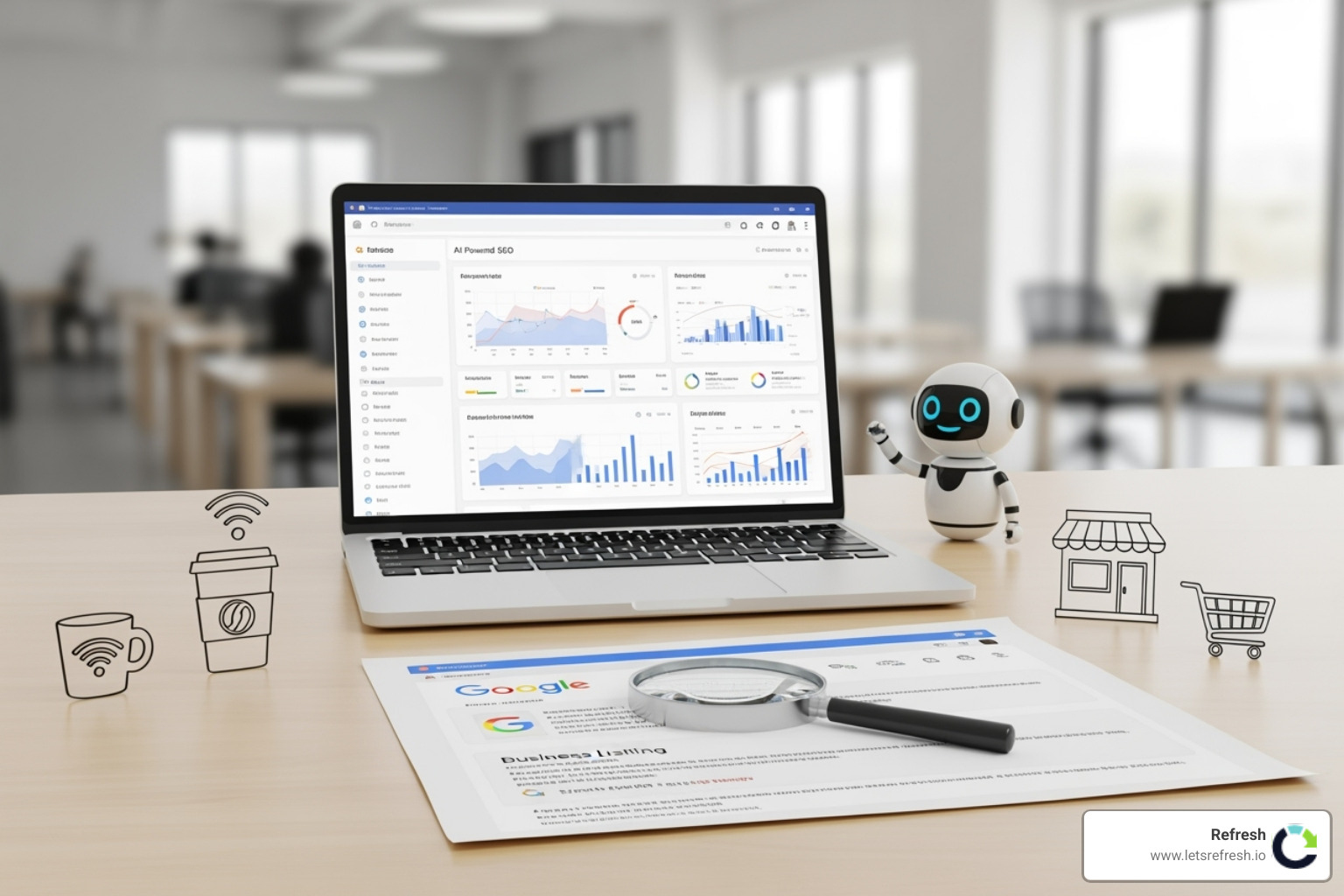Why Your Small Business Needs SEO + AI Tools to Compete in 2026
By Spenser Robinson - October 8, 2025

In the ever-evolving digital landscape, staying ahead of the curve is not just an advantage; it’s a necessity for survival. For small businesses, the challenge to compete with larger corporations is more pronounced than ever. As we look towards 2026, the integration of Search Engine Optimization (SEO) with Artificial Intelligence (AI) is no longer a futuristic concept but a present-day reality that is reshaping the competitive environment. This article will explore why your small business needs to embrace SEO and AI tools to not only compete but thrive in the years to come.
The New SEO Landscape: Powered by AI
Traditionally, SEO has been a labor-intensive process of keyword research, content creation, and backlink building. While these elements remain crucial, AI is revolutionizing how we approach them. AI-powered tools can analyze vast amounts of data, identify patterns, and make predictions with a level of accuracy and speed that is unattainable for humans. This allows small businesses to automate and optimize their SEO strategies, leveling the playing field against competitors with larger marketing teams and budgets.
According to a Forbes article by Dr. Bin Tang, AI-powered SEO can be a game-changer for small businesses looking to expand their reach globally [1]. AI tools can analyze massive multilingual datasets, automate content optimization for different regions, and identify local competitors and keyword opportunities. This capability to transform content into contextually relevant material, rather than just a simple translation, is invaluable for businesses aiming to connect with a diverse audience.
Actionable AI-Powered SEO Strategies for Small Businesses
So, how can your small business leverage AI for SEO success in 2026? Here are some actionable strategies based on expert insights:
1. AI-Enabled Market Intelligence
Before you can compete, you need to understand the market. AI-driven tools like Google Market Finder and Similarweb can help you identify potential markets for your products or services and analyze the local competition. This intelligence allows you to make data-driven decisions about where to focus your marketing efforts.
2. Localized SEO Strategy
As noted in the Forbes article, 76% of online shoppers prefer to buy products with information in their own language [1]. However, localization is more than just translation. AI tools like DeepL and Weglot can help you create content that resonates with local cultures and search behaviors. This includes conducting localized keyword research to understand regional differences in search queries.
3. Strategic Use of Generative AI Content Tools
Generative AI tools like ChatGPT, Jasper, and Copy.ai can be powerful allies in content creation. They can help you generate ideas, create outlines, and even draft entire blog posts or product descriptions. However, it's crucial to remember that the human element remains essential. Use these tools to enhance your creativity and efficiency, but always inject your brand voice and verify the accuracy of the content.
4. Performance Monitoring and Iteration
AI-powered SEO tools provide real-time data and insights into your website's performance. This allows you to monitor your rankings, track your competitors, and identify areas for improvement. By continuously monitoring your performance and iterating on your strategy, you can stay ahead of the competition and adapt to changes in the search landscape.
The Economic Impact: Why AI-Powered SEO Matters
The numbers speak for themselves. McKinsey estimates that generative AI could contribute up to $4.4 trillion in productivity per year to the global economy, with the majority of these gains coming from increases in marketing and sales productivity [1]. For small businesses, this represents an unprecedented opportunity to punch above their weight class and compete with much larger organizations.
Consider the traditional approach to SEO. A small business might spend countless hours manually researching keywords, analyzing competitors, and optimizing content. With AI-powered tools, these tasks can be automated and completed in a fraction of the time, freeing up valuable resources to focus on other aspects of the business. This efficiency gain is not just about saving time; it's about enabling small businesses to execute sophisticated marketing strategies that were previously only accessible to enterprises with deep pockets.
Real-World Applications: From Theory to Practice
Let's look at some concrete examples of how small businesses can implement AI-powered SEO strategies. Imagine you run a boutique online store selling handmade jewelry. Using AI-driven market intelligence tools, you discover that there's a growing demand for your products in Germany and Japan. Traditional SEO would require you to hire translators and local marketing experts to create content for these markets. With AI, you can use tools like DeepL to create culturally appropriate, localized content that resonates with these audiences.
Furthermore, AI can help you identify the specific keywords and search terms that potential customers in these markets are using. For instance, while an American customer might search for "handmade silver necklace," a German customer might use "handgefertigte Silberkette," and a Japanese customer might search in their native language. AI tools can identify these nuances and help you optimize your content accordingly.
The Human Touch: AI as a Co-Pilot, Not a Replacement
While AI is incredibly powerful, it's important to remember that it's a tool, not a replacement for human creativity and judgment. The most effective SEO strategies combine the analytical power of AI with the intuition and creativity of human marketers. As Dr. Tang notes in his Forbes article, the secret lies in viewing AI not as a shortcut but as a strategic co-pilot [1].
This means using AI to handle the heavy lifting of data analysis and content optimization, while you focus on crafting a unique brand voice, building relationships with your customers, and creating authentic, engaging content. AI can tell you what keywords to target and what topics are trending, but it can't replace the human touch that makes your brand special.
Getting Started: Your First Steps with AI-Powered SEO
If you're new to AI-powered SEO, the prospect might seem overwhelming. However, getting started is easier than you think. Here are some practical first steps:
1.Start with one tool: Don't try to implement every AI-powered SEO tool at once. Begin with a single tool, such as Google Market Finder or a keyword research tool like SEO.ai, and master it before moving on to others.
2.Focus on one market: If you're considering expanding into new markets, start with just one. This allows you to test your AI-powered strategies and refine your approach before scaling up.
3.Monitor and adjust: AI-powered SEO is not a "set it and forget it" solution. Regularly monitor your performance, analyze the results, and adjust your strategy as needed.
4.Invest in learning: Take the time to learn about AI and SEO. There are countless free resources available online, including tutorials, webinars, and blog posts, that can help you understand these technologies and how to use them effectively.
The Competitive Advantage: Why Now is the Time to Act
The window of opportunity for small businesses to gain a competitive advantage through AI-powered SEO is open right now, but it won't stay open forever. As more businesses adopt these technologies, the competitive landscape will shift, and early adopters will have a significant advantage. By embracing AI-powered SEO today, you can position your small business for success in 2026 and beyond.
The future of SEO is here, and it's powered by AI. The question is not whether you should adopt these tools, but how quickly you can integrate them into your marketing strategy. The businesses that thrive in the coming years will be those that recognize the transformative power of AI and use it to create more effective, efficient, and competitive SEO strategies.
Conclusion
The integration of AI into SEO represents a fundamental shift in the digital marketing landscape. For small businesses, this shift presents both a challenge and an opportunity. By embracing AI-powered SEO tools and strategies, you can level the playing field, compete with larger corporations, and reach new markets that were previously out of reach. The key is to start now, learn continuously, and view AI as a strategic partner in your journey to success. The future is bright for small businesses that are willing to embrace the power of AI-powered SEO.
References
[1] Tang, B. (2025, May 21). Scaling Your Small Business Globally With AI-Powered SEO. Forbes. Retrieved from https://www.forbes.com/councils/forbesagencycouncil/2025/05/21/scaling-your-small-business-globally-with-ai-powered-seo/

About the author
Spenser Robinson
Professional UX Designer, Entrepreneur and overall creative. Spenser has been dedicated to sharing stories from our community and creating opportunities for others through various mediums. Founder of Black Business Mine Publishing House, a company that creates content distinctly for OUR community, while offering business consulting, and comprehensive web design and development services.
MILLIONAIRE WEB SERVICES | BOOK FREE WEBSITE CONSULTATION | HIRE ME AS YOUR DEVELOPER
STACKS & STORIES | DIGITAL CRAFT DIGEST | PLAY 2 WIN DA GAME SPORTS



